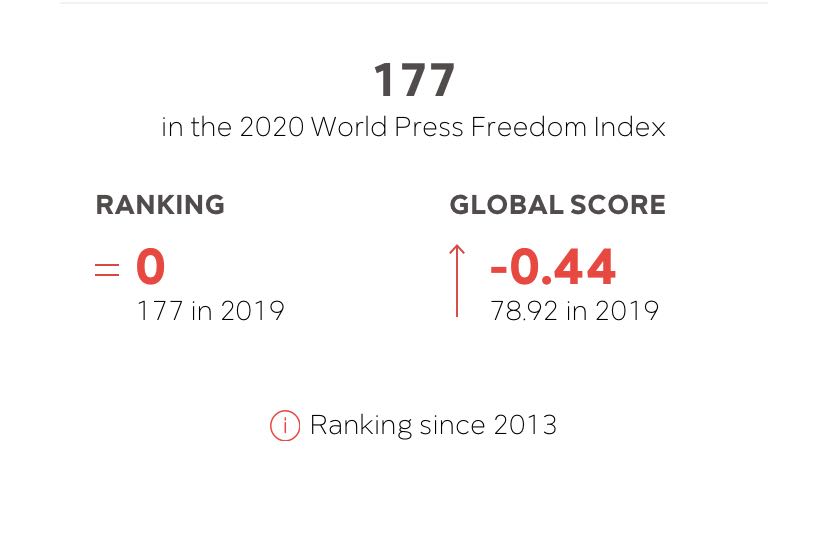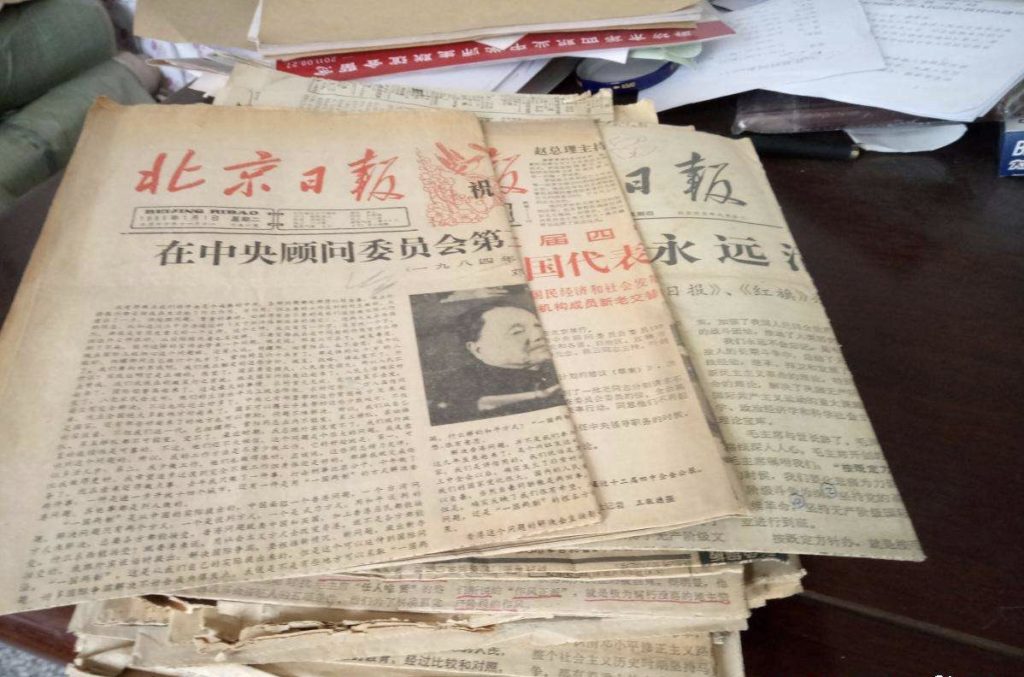In the 2020 World Press Freedom Index, China ranked 177th out of 180 countries, scored lower than in 2019. Investigative journalists cannot publish the manuscripts unless they employ some strategies. How do people evaluate this situation?
As a well-known journalist in China, Zhanjiang’s experience is full of legend. From a fitter apprentice to a Navy soldier, from a librarian to a newspaper supplement reporter, he did not enter the university until he was 34 years. He was admitted to the Journalism Department of the Renmin University of China with a master of law and a doctor of law. After his graduation, he engaged in journalism for more than 20 years.
“This is the worst time in 30 years.” This is the assessment from Jiang Zhan, one of the most important professors who specialize in investigative journalism in China. He is pessimistic about what investigative journalists are going through.
It has been a long time since censorship was introduced in China, a social model has been successfully imposed to control news and information and online surveillance, aiming to keep the safety of the whole country and protect the interests of citizens. It became stricter than before in these years, internet communication has also been regulated.
Jiang Zhan described the present situation as “hopeless”, as he believed the strict censorship suppress almost all the journalists in China. He is over 60 years old but still works as Vice President in the School of Communication, Beijing Normal University.
“Caixin has become the only one I know (which uses strategies to publish investigative news),” said Jiang, “Although there must be the informants and controversies we don’t know.”Caixin’s reports have been hotly debated in a long period. The reason is that Caixin’s news often differs from that of other media outlets. They do not just edit the government’s press release and be a reinforce, they try to investigate by themselves and provide stakeholders a voice.

Because of the suppression from the government, they get acquainted with reporting strategically. Sometimes they convert investigative reporting into explanatory reporting, sometimes they lengthen the manuscript to shift the focus to the latter part.
Although the journalists get used to this kind of practice, they still grumble. “Don’t idealize your job too much,” a journalist post on Weibo.
Some journalists said that if they just treated investigative journalism as a job that could help them to meet their material needs instead of a career worthy to take pains, in that way, revision, and strategy would become more acceptable.
Even if it reduces journalists’ professional expectations of investigative journalism, the control of news content never satisfies them. They still complain about the difficulty of using the strategies. “No one would like to do such a thing if we had a choice.” said a new journalist, he found it hard to appreciate the way he worked.
As the leadership changed in the CCP, changes in overall policy have led to a tightening of media freedom. Topics that used to be common in journalism are off-limits now. “Censors know all the things you plan to do,” said Jiang, “even operating on the margins of legality will be foreseen and be forbidden”
Journalists and editors in media organizations working for investigative news have a similar feeling. “Lots of topics that used to be common cannot be selected as there are more limitations released by the Publicity Department of the Communist Party of China and Cyberspace Administration of China,” said Cindy, an editor working for an official media.
“Fraud, academic misconduct, government inaction that the topics used to be normal cannot be seen now, no matter what kind of strategies you use”
Cindy
“You can hardly tell which department issued these prohibitions,” Cindy added, she believes that there is little space left for strategic investigative reporting.
The narrowing of topics and lowering of professional expectations have increasingly sapped the enthusiasm of these investigative journalists.
Anthony, an investigative journalist in China said that compared to the investigative journalists working in other countries, Chinese journalists should not only finish the tough investigation progress but also handle the obstacle caused by the censorship.
The difficulty of their work has been doubled to some extent. “Even if we are willing to bear these pressures, we cannot bear to have our efforts underestimated.” Anthony’s “the underestimated efforts” did not only mean his reports were often cut or revised but also complained about the remuneration.
The higher cost of time and energy did not contribute to a higher salary, so it is reasonable that the outflow of talent is the direct consequence. “No one wants to do a meaningless job,” said Anthony, he tried to explain the serial reaction between the necessary of strategies and the damage of the whole industry.
He said that he used to feel sneaky about reporting using strategies, but now his discomfort gradually faded away. He has got accustomed to adjusting his report to a style he does not like. He no longer feels unwilling to meet such requests.
“It’s like a process that saps a journalist’s passion,” said Anthony, he would prefer to work as an investigative journalist abroad. He thought he might get a better experience in terms of pay and freedom.
However, he also said that thanks to these strategies applying, more topics became possible to publish in China. Journalists twist the angle or the format of the report to help it out, the diversity of topics, and the public’s right to know have been guaranteed in this special way.
“For me now, I don’t think using strategies is unendurable,” said Qi, a new investigative journalist working in a media organization in Beijing, “It is at least a window left when the door has been blocked.”
This kind of practice may take journalists more time to find a proper angle, but at present it is the only chance for these sensitive realities to be revealed. A milder report with downplaying the conflicts or converting to interpretive reporting could be a choice.
Talking about whether this kind of report could complete the task of clearly reflecting social problems, Anthony and Jiang Zhan unified their points of view. Even though not all the readers could get the information the media would like to transmit, mere records make sense.
“Sometimes, though, strategic reporting sacrifices facts that seem more direct and sharp, it is still effective for the long-term audience of investigative reporting,” said Anthony, “They can understand the meaning behind the story and infer the reporter’s deep intentions.”
Liang Wei is a reader who has kept a watchful eye on the investigative reports for over 20 years. He said he must be one of the people who knows the strategies the most. He had read lots of investigative reports on different newspapers.

“Investigative is not for all.” He admits that some investigative reporting is so hidden that most readers ignore it, but it is understandable to those who really care about the event itself or the investigative news.
“The prime time for investigative journalism has gone,” said Liang Wei, “The strategies used in the past are now ineffective.
“Even if some investigative reports could be published online, they could soon be retracted. If you don’t read it immediately, all you’ll see is a ‘404’ page.”
Liang Wei found that racing the time is a particularly important strategy among investigative journalists now, reporting before the official ban could be a success. Besides, reports on the plight of groups expressed by individual experiences can also be published to a certain extent.
He acknowledged the essentials of using strategies because if it weren’t for this curvilinear approach, investigative reporting that might expose the dark side of the society would be “extinct” in China.
“The strategic reporting way is the crystalization of investigative journalists’ wisdom, they have long fought censorship. It is not innuendo or concession, but it’s a balance of compromise between the two forces.”
This is how Liang Wei understood this kind of practice.
These strategic reports are not just a test for journalists and readers, but also a tricky one for editors, as they are the most direct gatekeepers and the people responsible.
Publish by employing strategies is like a probe on the edge of the danger, it makes the editors feel hard. They have to balance the news value and the “safety level”. If the news feature is deleted by the authority after its release, the editor even the whole media organization may be punished as well.
Cindy is often troubled by the selection and scale of investigative articles. She found that there were times when young journalists wanted to try their hand at investigative reporting, she had to reject many of the topics because of self-censorship.
“I know these topics are valuable, but the probability that they can pass censorship is almost zero,” said Cindy, she felt sorry but helpless.
In fact, she often shares the same wish as the journalist, she also hopes to promote the publication of this investigative news. She ever worked all night with journalists to discuss the rewriting and modification of the manuscripts.
“If the strategy is effective, the post is sent, thus all the effort is worth it,” said Cindy, “Although I have rejected a lot of reports, I don’t want let go of anything that gets any possibility sent out using a strategy.”
The existence of the strategies is both trouble and relief for Cindy. It forced her to take every risk but also take pride in her efforts. “It’s a subtle emotion that follows me every day, I’m really afraid of getting into trouble but wanting to challenge the established rules.
“Every time the strategy worked, for me is kind of encouragement, but also a kind of felicitation.” She felt that she evaluated different outcomes before each decision and wavered between striving for stability and sticking to professionalism.
Yuan Yao who is a reporter now working for The Beijing News graduated from Cardiff University. She said that the media environment she working in was very different from what she knew when she studied in the UK.
She mainly in charge of transportation news, and she had few opportunities to interview or dig up stories independently. Most of the news leads come from official announcements, so there is no much room for manoeuvre.
Most of what she knows about investigative journalism comes from the experience of her colleagues. She said she might try it on her own later.
“I don’t think it’s a bad thing to use strategy for reporting, as it’s a necessary and meaningful way in the existing environment,” she said, “I’ve never worked in foreign media, so it’s probably one-sided.”
She believes that the limitations of her experience may cause her to have some cognitive biases. She is content with her current working environment although she also yearns for a different experience abroad.
Without the opportunity to emulate press freedom abroad, many journalists and scholars believe that using reporting strategies is the least costly compromise. This is a practical method that not only meets the official requirements but also balances the responsibility of journalists.
This kind of practice is generated by the context of policy obstacles but it could lead to a news ecology closer to normal. The journalists, editors, and scholars are the last ones to witness and experience. In other words, they are people who hate the strategies the most but who precious the strategies the most.
“China is a paradise for investigative journalism, but not for investigative journalists,” Jiang Zhan said, he insisted that what needs to be seen is not techniques but substance. He said that the foreign system was valuable to lean.
He quotes Engels as saying that “The freedom of the press in 19th-century England depended on the grace of its rulers,” and indicates that that is why investigative journalism flourished in China in previous years.
Jiang prefers the news environment in China before 2012. However, he is also well aware that the policy without institutional guarantee and relying only on open-minded leadership is futile. Jiang posted a picture with the words “CCTV surnamed the CCP, absolute loyalty, please review,” and asked “What more I can ask for?
“For researchers, both good and bad are subject to study, but we need to study now are censorship and propaganda, with the perspective of post-totalitarianism or digital totalitarianism.” Jiang typed this message in English to avoid social media censorship.
(To protect the security of interviewees, Anthony, Cindy, Qi, Liang Wei are pseudonyms.)
